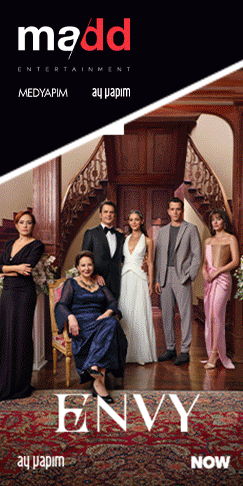In the following interview with ttvnews, Sebastian van Barneveld, Director of Global Distribution at Talpa Studios, explains the strategy behind creating and developing formats that are guaranteed to find success on platforms and screens all over the world.
Owners of some of the most successful formats in the world, Talpa Studios is synonym of international success, creating concepts and brands that are guaranteed to travel the globe, and increase viewership on any network or platform.
And the Hispanic market is no exception. Just this year alone, one of Talpa’s newest formats, The Quiz With Balls, landed new local versions in Argentina, Uruguay and Portugal; while 3 Minutes of Fame found a new home in Brazil with TV Globo, and Trivial Pursuit has already made its way to Spain, just a few months after its launch at Mipcom 2024.
Not to mention, of course, more established formats such as The Floor, which has already reached more than 20 markets around the world, including Spain and several in Latin America, more recently Chile and Uruguay.
What’s the secret to this global recognition? In addition to creating innovative ideas and formats, the team at Talpa Studios invests heavily in ensuring their shows reach their highest potential in each territory they travel to, by studying the local culture, collaborating with local producers, finding the right talent, and even setting up international production hubs.
In the following interview with ttvnews, Sebastian van Barneveld, Director of Global Distribution at Talpa Studios, explains the strategy behind this continuous bet on international expansion, the keys to making a globally successful format, and the company’s latest deals in the region.
How valuable is investing in hubs today to grow the international reach of a format? At what point in the international journey of a format does Talpa Studios evaluate creating a new hub and what are the key factors behind that choice?
At Talpa Studios, the main goal of investing in hubs isn’t just to expand reach – it’s to create value through strategic collaboration.
We work with both local and international partners to achieve cost efficiencies in a market under pressure due to audience fragmentation and shifting revenue models; production scale, for example through shared set design, which enables us to deliver a premium viewer experience that stands up to global content expectations; sustainability, by building hubs in different regions to reduce the ecological footprint of our productions; and expertise and consistency, by giving every local version access to our highly experienced Talpa Studios production teams – teams that have already created tailored versions of The Floor for 12 different markets and know exactly how to make each new version a success. There are countries already returning to the hub this fall, for more seasons.
We don’t create a hub at the start of a format’s life cycle – we scale into one when a format shows multi-market potential and when regional production demand justifies it. A good example is The Floor and The Quiz with Balls, both of which were produced in our Netherlands hub for multiple territories. We’re now replicating this model in Argentina and the Baltics and are exploring expansion in other strategic regions.
What are the key elements to adapt locally hits like The Floor?. Besides the talent, how does local culture and idiosyncrasy get integrated to the format?
At Talpa Studios, we design formats with global appeal and local relevance, from day one. That mindset is rooted in our creative DNA – and in the nature of the Dutch market: small, competitive, and highly representative of broader European tastes.
When we localize a format like The Floor, we focus on creating a version that feels both culturally relevant and globally consistent. That starts with selecting the right host, which we always do in close collaboration with our local partners. We also look at casting choices that align with national storytelling styles, and we tailor the question categories to reflect local knowledge and pop culture.
Importantly, the format itself keeps evolving. Each new local version brings fresh creative ideas – from gameplay twists to visual elements – that help improve and enrich the global blueprint. It’s a great example of how local adaptations don’t just reflect a culture, but actively contribute back to the format’s development. We call it adapting, updating and making it better.
What elements are you looking at today in a format to label it -as close to possible- as a “cant-miss” content?
We look for formats with a combination of strong hooks, clear narrative beats, and constant engagement. Whether it’s a game show or reality, we want formats that create tension, momentum, and payoff – within a structure that’s repeatable and scalable. Storytelling is key – but it has to be built into the format itself, not just rely on talent or editing. At Talpa Studios, we use data, innovation, and AI to optimize those storytelling mechanics and bring each format to market in the most effective way possible.
What are the latest developments regarding brand integration solutions for these successful shows? Regarding your formats, how has brand partnerships evolve in recent years?
Brand partnerships have evolved from simple sponsorships to strategic integrations that live within the DNA of the format. At Talpa Studios, we approach this through what we call 360 propositions – formats that are built with commercial partners in mind from the outset.
A great example is The Quiz with Balls, where the Dutch National Lottery (Lotto) became a natural partner thanks to the show’s high-energy, chance-driven gameplay. The brand wasn’t just added on – it became part of the tone, excitement, and marketing story around the format. In the Netherlands, the yello (Lotto) balls even became the show’s main eye-catcher.
We also work with IP holders like Hasbro to co-create rather than license. That approach deepens the brand connection and creates room for joint innovation, such as Trivial Spain.
Talking about working alongside brands, your format with Hasbro Entertainment, Trivial Pursuit, has recently closed a deal in Spain. What is this format potential around the world?
Trivial Pursuit is a household name: 44% of Europeans own a Trivial Pursuit board game. That brand recognition gives it a head start in terms of marketing and audience connection – it immediately communicates trust and familiarity. The gameplay is engaging, intellectually satisfying, and built for adaptation into different audience breakdowns. It’s paired with a high-end, immersive set design that elevates the show into a visual experience.
Combined with Hasbro’s backing and our global production infrastructure, Trivial Pursuit is a versatile, scalable format with strong international potential- especially in markets where both quiz shows and legacy brands perform well. There’s a classic board game revival happening – and we’re actively talking to multiple partners about adapting other iconic titles. We’re always on the lookout for strong IP that can be reimagined for today’s audiences.











